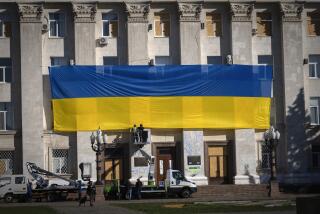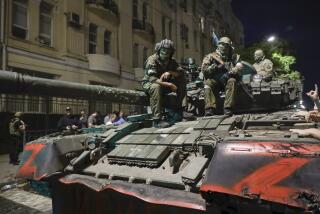Chechens Say There’s a New Piper to Pay
- Share via
GROZNY, Russia — Before the war in Chechnya began last fall, truck driver Rakhman Usmanov had to pay local warlords for the right to drive his tanker truck on the highway and deliver oil to a local refinery.
Today, with Russian forces occupying most of the rebellious republic, one thing has changed: Now he pays Russian commanders for the right to drive his truck and make oil deliveries.
“The only difference is that we have to pay the Russian troops at checkpoints,” Usmanov said. “The Chechen field commanders used to send out their people to collect the money.”
Across the devastated republic, where oil is the only industry to survive two wars in six years, Russian commanders have stepped in to take the place of the brutal warlords who once controlled the profitable business, Chechen civilians say.
About 2,000 primitive mini-refineries--most of them unlicensed and unregulated--had sprung up in oil-rich Chechnya over the past decade, becoming one of the biggest sources of wealth in the lawless republic.
Advancing Russian troops have destroyed many of the smaller refineries, setting them on fire and producing thick smoke that still hangs over the devastated capital, Grozny, and other areas. But many of the larger refineries remain intact and have become a good source of revenue for the Russian military, said civilians who work in the illegal oil business.
For the most part, Russian forces control the oil trade by controlling the roads, Chechens say. Soldiers at the numerous checkpoints on the republic’s highways extract payments from trucks before allowing them to pass, they say.
“Once we get to a checkpoint, we negotiate a deal with the officers or with the military commander, pay them and drive on,” said Sultan Pashayev, 40, who owns an illegal refinery in the Chechen town of Shali. “Sometimes, if the officers are in a good mood, or if we pay them well, they even provide a security escort for the convoy. Business is business.”
Russian officials have repeatedly denied charges that their forces engage in widespread illegal conduct in Chechnya, including allegations of systematic looting of goods from Chechen homes, rape and summary execution of civilians.
In Moscow, Defense Ministry spokesman Gennady G. Dzyuba acknowledged that some soldiers might occasionally accept a bribe to let a truck pass through a checkpoint. But the charges that Russian forces have taken over the Chechen oil business, he said, are nothing but rebel propaganda.
“All these Chechen ‘reports’ about Russian troops controlling the illegal oil business in Chechnya are nothing but malicious conjectures and slander,” he said. “The only time that Russian troops come into contact with such refineries is when they blow them up.”
Pashayev, the refinery operator, charged that the Russians have destroyed the smaller, less profitable refineries while allowing the larger ones to keep operating.
“I can understand their position very well,” he said. “They needed to report their successes in blowing these refineries up. At the same time, they wanted to make some money on this highly profitable business and line their own pockets.”
Most of the Chechen warlords, who once held enormous power in the republic, have been killed or have fled to the mountains ahead of the Russian troops. The warlords, well known for kidnapping hundreds of people in the years between the wars, financed their operations with the steady income that came from providing “protection” to the region’s oil industry.
The creation of primitive, illegal refineries began in 1991 when the late separatist leader Dzhokar M. Dudayev came to power and Moscow in effect lost control of the republic, said Akhmet Idrisov, 51, a former member of the Chechen Environmental Protection Committee.
The small refineries operate along the same lines as homemade stills used to make moonshine. They follow no health or safety standards and foul the air, farmland and water supply with petroleum byproducts.
“No one cares about how much oil is wasted, where all the waste goes or what quality this gasoline is,” Idrisov said. “All safety regulations are disregarded. The environment is heavily polluted as a huge amount of carcinogenic agents are emitted into the air.”
Even though no other industry still functions in Chechnya, pollution in the republic has reached alarming levels, he said, exceeding Russian government standards many times over. The Russian troops’ practice of setting the refineries on fire has made the problem even worse.
Refinery owner Pashayev said the Russian troops and the Chechen oil traders have settled into a business relationship that serves everyone in the region by permitting the distribution of fuel to the civilian population. Some of the oil is also transported to other parts of Russia for sale there.
“Soldiers know us and our drivers by face, and the whole business rolls on like a well-oiled machine,” he said. “If we take these products out of Chechnya, we just pay the military again and officers arrange for a security convoy for us again.”
Dzyuba, the Defense Ministry spokesman, denied that Russian forces have a business relationship with Chechen oil traders and attributed such accounts to Chechen sympathizers twisting the truth.
“Chechens are notorious for their anti-Russian propaganda, and myths about Russian commanders running the illegal oil business in Chechnya is a classic example of such propaganda,” he said.
Dzyuba said the practice of bribe-taking in the Russian military is no different from the graft that normally occurs among the general population.
“A lot of people in Russia, regardless of where they work, take bribes and no one makes a secret of it,” he said. “But it would be incorrect to call the entire people bribe-takers. The Defense Ministry is interested in exposing such cases no less than anyone else.”
Before the war began last year, Said Dunayev, a 44-year-old welder, had built his own small refinery in the courtyard of his house in Grozny and sold gasoline to his neighbors.
When elite Russian police troops seized the city in December, the soldiers assigned to his neighborhood agreed not to destroy his little setup after he promised to pay the commander 5,000 rubles--about $180--a month.
“From that point on, he or some of his people would show up at my gate once a month waiting for money,” Dunayev said.
In March, when the unit was about to be sent home, the commander visited Dunayev a few days ahead of schedule and demanded his monthly payment. Dunayev said he scraped together what money he could and borrowed some from a neighbor but was still short 300 rubles--about $11.
“Suddenly the officer--whom I had invited for tea many times before--exploded and started calling me names,” Dunayev said. “He threatened to kill me and all my family members if I did not give him the money. I thought he would kill me.”
Dunayev said that he thanked Allah for his survival but later realized that he had underestimated the Russian officer. When a replacement unit arrived, the troops kicked in his door and the new commander told him, “The greedy one pays twice.” The soldiers destroyed the refinery and Dunayev’s house.
“They threw me out of the house and set it on fire,” Dunayev said. “And it was then that I realized for the first time how much a human life costs in Grozny today--300 rubles.”
*
Special correspondent Nunayev reported from Chechnya and staff writer Paddock from Moscow.
More to Read
Sign up for Essential California
The most important California stories and recommendations in your inbox every morning.
You may occasionally receive promotional content from the Los Angeles Times.












